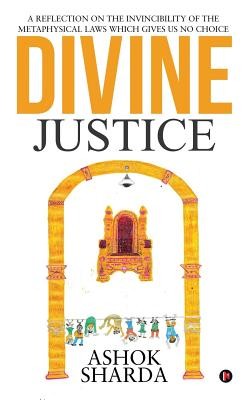
- We will send in 10–14 business days.
- Author: Ashok Sharda
- Publisher: Notion Press
- ISBN-10: 1644297671
- ISBN-13: 9781644297674
- Format: 12.7 x 20.3 x 2.3 cm, minkšti viršeliai
- Language: English
- SAVE -10% with code: EXTRA
Reviews
Description
In Divine Justice, the author has ventured to 'see' and evaluate justice system in the frame work of the 'laws' beyond space and time. His 'seeing' transcends all written laws- scribered or statute, applicable to various regions in different times and presents a scene in which human looks absolutely hapless defending a trial initiated against him with a predetermined judgment. The hero, arrested and detained, struggles to find his way out of the process of law, in his endeavour to find acquittal. He can sense the long tentacles of the law reaching for him. His interactions with various jail inmates, followed by a counsellor show him no 'way' that will enlighten his path for a permanent acquittal. Eventually, he finds a possibility of a 'way' to jump the invisible high walls of the infinite jail from a mysterious character known as 'invisible man'. But it's too late by now because his day of judgment has arrived. He is fated to die like a dog, a fate no different than K's, the hero of Kafka's Trial.
'A', the ill-fated hero questions the very invincibility of the law, the choice-less-ness in each happening or unhappening that affects his life. Desperate, he cries out at one point: 'how can I break a law when the laws allows me no cushioning to break any law, when law determines where I am and what I am doing at any given point of time, when desires, commanded by laws, rises from the pit of my core and commands me...when my hands are not my hands, my legs are not my legs....Why should I be punished for a happening when I had no conscious choice in this happening?' At some other place he argues: 'it's hard to accept the laws of the jail once you become aware of the horror of your situation in the wake of the realization you are in jail.' Authors is conscious of individualistic approach to issues confronting the mankind, He speaks out in no uncertain words through the mouth of yet another co-accused: 'I know I spoke profanity. In the kind of turmoil, I am do you think I really care. Two hoots for this creation.'EXTRA 10 % discount with code: EXTRA
The promotion ends in 21d.06:09:58
The discount code is valid when purchasing from 10 €. Discounts do not stack.
- Author: Ashok Sharda
- Publisher: Notion Press
- ISBN-10: 1644297671
- ISBN-13: 9781644297674
- Format: 12.7 x 20.3 x 2.3 cm, minkšti viršeliai
- Language: English English
In Divine Justice, the author has ventured to 'see' and evaluate justice system in the frame work of the 'laws' beyond space and time. His 'seeing' transcends all written laws- scribered or statute, applicable to various regions in different times and presents a scene in which human looks absolutely hapless defending a trial initiated against him with a predetermined judgment. The hero, arrested and detained, struggles to find his way out of the process of law, in his endeavour to find acquittal. He can sense the long tentacles of the law reaching for him. His interactions with various jail inmates, followed by a counsellor show him no 'way' that will enlighten his path for a permanent acquittal. Eventually, he finds a possibility of a 'way' to jump the invisible high walls of the infinite jail from a mysterious character known as 'invisible man'. But it's too late by now because his day of judgment has arrived. He is fated to die like a dog, a fate no different than K's, the hero of Kafka's Trial.
'A', the ill-fated hero questions the very invincibility of the law, the choice-less-ness in each happening or unhappening that affects his life. Desperate, he cries out at one point: 'how can I break a law when the laws allows me no cushioning to break any law, when law determines where I am and what I am doing at any given point of time, when desires, commanded by laws, rises from the pit of my core and commands me...when my hands are not my hands, my legs are not my legs....Why should I be punished for a happening when I had no conscious choice in this happening?' At some other place he argues: 'it's hard to accept the laws of the jail once you become aware of the horror of your situation in the wake of the realization you are in jail.' Authors is conscious of individualistic approach to issues confronting the mankind, He speaks out in no uncertain words through the mouth of yet another co-accused: 'I know I spoke profanity. In the kind of turmoil, I am do you think I really care. Two hoots for this creation.'

Reviews